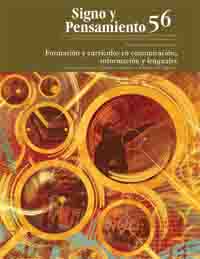Why should we comprise Humanistic Studies in a School of Communications?
##plugins.themes.bootstrap3.article.details##
This work seeks to explain and promote the presence of humanistic studies in a school of communication, specifically, in the School of Communication and Languages at Pontificia Universidad Javeriana. It shows a reflection and a proposal for undergraduate study programs through the incorporation of humanities, a component that serves as a basis for the construction and development of both disciplinary and professional training. Human science studies are of paramount importance for the professional practice of communicators, journalists, language teachers, or information scientists. Additionally, they foster plural and multi-dimensional thinking in students, thus enabling them to embrace perspectives and realities other than their own.
Interdisciplinarity, Otherness, Humanism, Competence-based education, Professional fields, Curricular structures.Interdisciplinariedad, Otredad, Humanismo, Formación en competencias, Ciclos profesionales, Estructuras curriculares.Interdisciplinaridade, Alteridade, Humanismo, Treinamento de Competências, Ciclos profissionais, Estruturas Curriculares.
Coetzee, J. (2001), Elizabeth Costello, Barcelona, Mondadori.
Ferraris, M. (2005), Dove sei: ontologia del telefonino, Milán, Bompiani.
Morin, E. (1993), Tierra-Patria, Barcelona, Kairós. — (2006), Breve historia de la barbarie de la humanidad, Barcelona, Paidós.
— (2008), Introducción al pensamiento complejo, Barcelona, Gedisa.
Nussbaum, M. (2001), El cultivo de la humanidad, Barcelona, Paidós.
Sloterdijk, P. (2006), Normas para el parque humano, Madrid, Siruela.
Steiner, G. (2008), Los libros que nunca he escrito, Madrid, Siruela.
Treviño, P. (2000), “Apuntes para una noción de la modernidad”, en: Zeraoui, Z. (comp.), Modernidad y posmodernidad: la crisis de los paradigmas y valores, México, Limusa.


